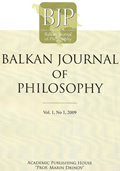The endless truth in the P. M. formal systems (In honor of the Principia Mathematica (1910-1913) of Bertrand Russell)
The endless truth in the P. M. formal systems (In honor of the Principia Mathematica (1910-1913) of Bertrand Russell)
Author(s): Mihai D. VasileSubject(s): Philosophy
Published by: Институт по философия и социология при БАН
Keywords: PM system; truth; consistency; completeness; demonstrability; type theory; decidability;
Summary/Abstract: Any logical analysis – and therefore philosophy itself – begins with the question: is there an indubitable knowledge? To answer this question Bertrand Russell appeals to tradition – both mathematical and philosophical – in which he recognizes himself. The process used by Russell, in order to build mathematics on a new foundation, was to build concepts logically, starting from atomic elements and known relationships. For example, a logical construction as that of the “class” is that a sentence, which includes a fixed concept, is turned into a logically equivalent statement (example analyzed by Russell is “Scott” and “the author of Waverley”) which unlike the first, entails relations that include concepts. Thus, the primitive concept can be replaced and removed. The new method was named the “theory of types” and became the intellectual program of Russell and his successors. Among the method’s performances is solving logical and mathematical paradoxes. The importance of Russell’s logical investigations exceeded the reductionist program, stimulating the formalist program of philosophy and methodology and the logical analysis of the language of science with a logical-mathematical apparatus. This program was definitively concluded, it seems, by Kurt Gödel’s results on the decidability problem in the formal axiomatic systems of P type, a problem closely linked to the question of “truth” and the two other meta-theoretical properties of P formal systems, namely “consistency” and “completeness”. Gödel’s Theorems do not affect the now established legitimacy of a meta-theoretical system concerning the formalizing processes, but prove that the hilbertian original program to reduce mathematics to logic is old and the very meaning of the whole process of realizing it must be analyzed again. Considering that in a formal P system, the decision process is demonstrability of true statements, Gödel’s research findings prove the consubstantial relationship of the four meta-theoretical properties Truth-Consistency-Completeness-Demonstrability.
Journal: Balkan Journal of Philosophy
- Issue Year: V/2013
- Issue No: 2
- Page Range: 139-146
- Page Count: 8
- Language: English

